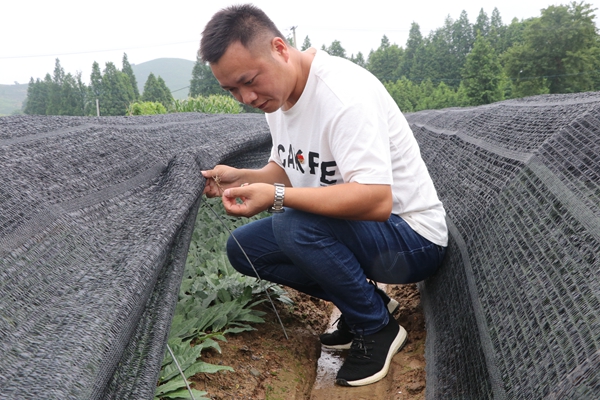Cultivating prosperity infused with dedication


Tian Hongjun is one of the first farmers engaged in the tea planting in Dazhai village. Together with three other fellow villagers, he launched a cooperative, contracting and planting the tea saplings in Dazhai in 2018.
Tian used to work in a brick factory in Jiangxi province, 700 kilometers from his hometown.
"It was hard. My wife stayed at home to take care of our children and our 2.7 hectares of land went to waste without farming," the 38-year-old recalls.
"Now farmers in the village, aside from looking after their own farmlands, can work at the tea-planting cooperative with a daily income of 80 yuan," Tian says proudly.
Zhang, of Zhiqiang village, emphasizes the success was also due to the comprehensive support offered by institutes and companies from Zhejiang province. When they encountered difficulties in growing tea, experts from the Tea Research Institute of the Chinese Academy of Agricultural Sciences provided them with technical support.
Because white tea requires a complicated manufacturing process, Yuanfeng Tea Machinery company from Anji donated 31 sets of white tea processing machinery to the tea cooperative in Zhiqiang village.
The sales are covered by Zhejiang Tea Group, which established a company in Yanhe county especially to help build an integrated supply chain.
Fu Gang, Party chief of Dazhai village, says that their villagers only used to growtea on a small scale and had little experience in running tea plantations, so, in the beginning, the villagers were concerned whether the plantation would actually turn a profit.
"Thankfully, apart from donating tea saplings to us, Huangdu village also offers us support in growing and management, and Zhejiang Tea Group helps us sell the tea. Our concerns are all resolved," Fu says.
Since 2019, Zhongzhai township has been expanding its tea planting area, adding more than 330 hectares of newly built plantations in seven other villages, bringing an income of 3.5 million yuan to 3,016 households, 13,172 people in total, including 1,235 impoverished households. The town aims to plant another 110 hectares of tea this year.
According to the local government report, white tea production has become the major industry of the town, not only enabling the residents to seek local job opportunities, but also attracting people there for work or to trade.
The town has been developing eco-friendly agriculture, including livestock breeding, ensuring that all residents struggling with poverty can make a living by participating in these causes.
Fu says that in 2018, Dazhai village registered 139 impoverished households, 686 people altogether, and by the end of 2019, 114 households and 586 people have been taken off the list.
The remaining 25 impoverished households followed soon after.
Meng Pinghong, an NPC deputy and a researcher with the Guizhou Academy of Agricultural Sciences, says such measures are regarded as a vital element in China's poverty alleviation efforts, as through developing local industries, such as tea-plantation, more of the poverty-stricken population will ensure a stable and increasing income, with their jobs being secured locally.
Yang Jun in Guiyang contributed to the story.




































